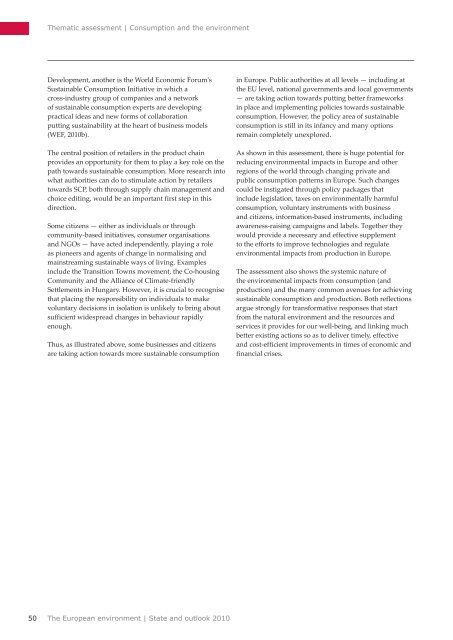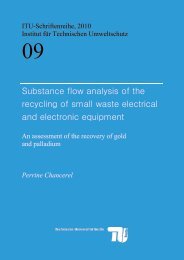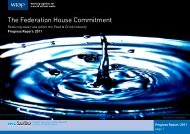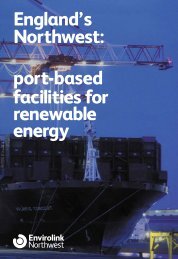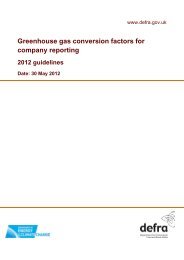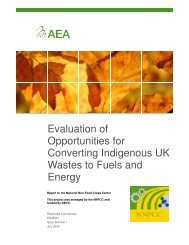Consumption and the environment (SOER2010) - European ...
Consumption and the environment (SOER2010) - European ...
Consumption and the environment (SOER2010) - European ...
Create successful ePaper yourself
Turn your PDF publications into a flip-book with our unique Google optimized e-Paper software.
Thematic assessment | <strong>Consumption</strong> <strong>and</strong> <strong>the</strong> <strong>environment</strong><br />
Development, ano<strong>the</strong>r is <strong>the</strong> World Economic Forum's<br />
Sustainable <strong>Consumption</strong> Initiative in which a<br />
cross‐industry group of companies <strong>and</strong> a network<br />
of sustainable consumption experts are developing<br />
practical ideas <strong>and</strong> new forms of collaboration<br />
putting sustainability at <strong>the</strong> heart of business models<br />
(WEF, 2010b).<br />
The central position of retailers in <strong>the</strong> product chain<br />
provides an opportunity for <strong>the</strong>m to play a key role on <strong>the</strong><br />
path towards sustainable consumption. More research into<br />
what authorities can do to stimulate action by retailers<br />
towards SCP, both through supply chain management <strong>and</strong><br />
choice editing, would be an important first step in this<br />
direction.<br />
Some citizens — ei<strong>the</strong>r as individuals or through<br />
community‐based initiatives, consumer organisations<br />
<strong>and</strong> NGOs — have acted independently, playing a role<br />
as pioneers <strong>and</strong> agents of change in normalising <strong>and</strong><br />
mainstreaming sustainable ways of living. Examples<br />
include <strong>the</strong> Transition Towns movement, <strong>the</strong> Co‐housing<br />
Community <strong>and</strong> <strong>the</strong> Alliance of Climate‐friendly<br />
Settlements in Hungary. However, it is crucial to recognise<br />
that placing <strong>the</strong> responsibility on individuals to make<br />
voluntary decisions in isolation is unlikely to bring about<br />
sufficient widespread changes in behaviour rapidly<br />
enough.<br />
Thus, as illustrated above, some businesses <strong>and</strong> citizens<br />
are taking action towards more sustainable consumption<br />
in Europe. Public authorities at all levels — including at<br />
<strong>the</strong> EU level, national governments <strong>and</strong> local governments<br />
— are taking action towards putting better frameworks<br />
in place <strong>and</strong> implementing policies towards sustainable<br />
consumption. However, <strong>the</strong> policy area of sustainable<br />
consumption is still in its infancy <strong>and</strong> many options<br />
remain completely unexplored.<br />
As shown in this assessment, <strong>the</strong>re is huge potential for<br />
reducing <strong>environment</strong>al impacts in Europe <strong>and</strong> o<strong>the</strong>r<br />
regions of <strong>the</strong> world through changing private <strong>and</strong><br />
public consumption patterns in Europe. Such changes<br />
could be instigated through policy packages that<br />
include legislation, taxes on <strong>environment</strong>ally harmful<br />
consumption, voluntary instruments with business<br />
<strong>and</strong> citizens, information‐based instruments, including<br />
awareness‐raising campaigns <strong>and</strong> labels. Toge<strong>the</strong>r <strong>the</strong>y<br />
would provide a necessary <strong>and</strong> effective supplement<br />
to <strong>the</strong> efforts to improve technologies <strong>and</strong> regulate<br />
<strong>environment</strong>al impacts from production in Europe.<br />
The assessment also shows <strong>the</strong> systemic nature of<br />
<strong>the</strong> <strong>environment</strong>al impacts from consumption (<strong>and</strong><br />
production) <strong>and</strong> <strong>the</strong> many common avenues for achieving<br />
sustainable consumption <strong>and</strong> production. Both reflections<br />
argue strongly for transformative responses that start<br />
from <strong>the</strong> natural <strong>environment</strong> <strong>and</strong> <strong>the</strong> resources <strong>and</strong><br />
services it provides for our well‐being, <strong>and</strong> linking much<br />
better existing actions so as to deliver timely, effective<br />
<strong>and</strong> cost‐efficient improvements in times of economic <strong>and</strong><br />
financial crises.<br />
50<br />
The <strong>European</strong> <strong>environment</strong> | State <strong>and</strong> outlook 2010


